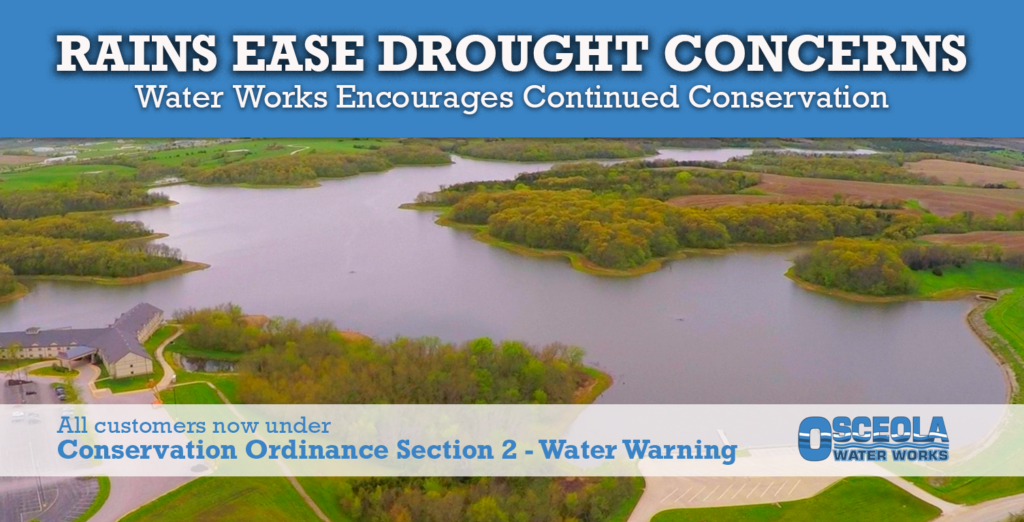At the May 9th Osceola Water Works Board of Trustees meeting, discussions surrounding the recent rains were, for the first time in almost a year, more positive. With several inches of rain throughout the region over late April and early May, levels at Osceola’s West Lake jumped from 1064.92 feet above Mean Sea Level (MSL) on March 25th to 1068.68 feet above MSL on May 9th, a difference of more than 3.75 feet.
With the jump in lake levels, the board unanimously decided to exit from Section 3 – Water Emergency of the Osceola Water Works Conservation Ordinance and enter into Section 2 – Water Warning.

“This, by no means, will reduce our commitment to water conservation and acquiring alternate water sources for our customers,” said board member, Larry Bishop. “If the rain stops tomorrow, God forbid, we’re right back to focusing on balancing our use with West Lake’s limited supply.”
Board members were quick to recognize that the recent increase simply brought Lake Levels back to where they were in late May of 2023, when prolonged drought conditions across the state were raising concerns with regional water utilities, administrators, and managers.
“While we’re still more than three feet below full pool level, we’re excited to see the increase in our available raw water supply,” said Brandon Patterson, Osceola Water Works Superintendent.
“We’ve been so impressed with our residential, commercial and industrial customers’ commitment to conservation over the past months,” said Alisha Kale, Water Board President. “We just ask that the dedication continue while we roll into Summer and continue our alternative water supply efforts.”
On May 9, 2024 Osceola Water Works’ Conservation Ordinance Section 2 – Water Warning restrictions goes into effect as follows:
A Water Warning may be declared when the water level in West Lake reaches an elevation 1069.0 feet above Mean Sea Level (3-feet below normal pool elevation of 1072.0 MSL). Under these conditions, no user shall use municipal water service in any manner contrary to the following:
- Outdoor watering and irrigation is prohibited, except as follows.
- Watering or irrigation of flower and vegetable gardens, trees and shrubs less than 4-years old, and new seeding or sod is permitted once a week with an application not to exceed 1-inch. Watering shall only be done between the hours of 8:00 P.M. to 8:00 A.M.
- Car washing is prohibited, except at commercial establishments that provide that service.
- No water shall be used to fill private swimming pools, children’s wading pools, reflecting pools or any other outdoor pool or pond.
- No water shall be used to wash streets, parking lots, driveways, sidewalks or building exteriors.
- No water shall be used for nonessential cleaning of commercial and industrial equipment, machinery, and interior spaces.
- Water shall be served at restaurants only upon request of the customer.
Water reclaimed or recycled after some primary use, such as water that has been used for washing or cooling, may be used without restriction. Additionally, water derived from sources other than the Osceola Water Plant may be used without restriction.
Penalties – Water Warning
The following penalties shall apply for violations of Water Warning use restrictions imposed under this Ordinance.
- First Violation: For a first violation, the Water Board shall issue a written notice of violation to the water user violating the water use restrictions imposed.
- Second Violation: For a second violation, a $65 surcharge shall be imposed.
- Subsequent Violations: For any subsequent violations, a $130 surcharge shall be imposed.
Any customer charged with a violation of the Water Warning use restrictions may request a hearing before the Water Board. The Water Board may conclude that a violation did not occur or that the circumstances under which the violation occurred warrant a complete or partial mitigation of the penalty.
As the board closed their meeting, Ms. Kale addressed the board room and online viewers to thank everyone for their dedication and participation in the community’s ongoing conservation efforts.
“Our citizens and businesses have shown that, working together, we can face these challenges,” said Kale. “As we lock in alternative water solutions, we going to see a bright future with sustainable water and exciting community growth.”